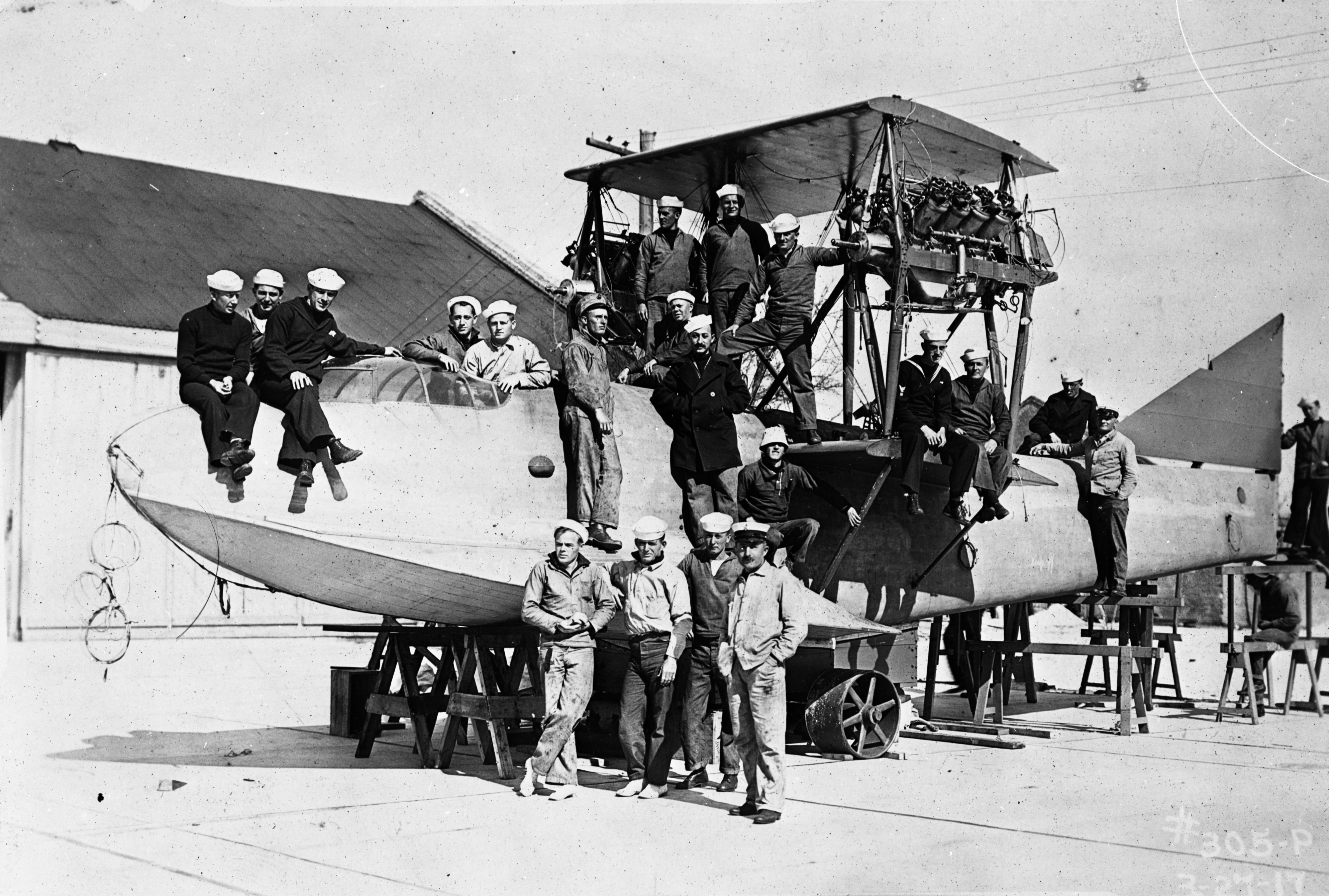Florida Folklife Collection
Florida Folklorists of Past and Present
Since the Florida Folklife Program began in 1976, many prominent folklorists began their careers in the Sunshine State. Not only did they contribute to Florida's folk studies, but they also honed the skills they would use in other programs and folk areas.
Peggy Bulger
Peggy A. Bulger served as Florida's State Folklorist and administrator of the Florida Folklife Program from 1976 to 1989. Not only was she Florida's first state folklorist, she was one of the only employees during the program's first years. Laying the foundation for today's diverse program, Bulger created the bulk of the fieldwork within Folklife Collection's first years.
A native of New York State, she received her MA in Folk Studies from Western Kentucky University in 1975; and her PhD in Folklife and Folklore from the University of Pennsylvania in 1992. After establishing Florida's folklife program, including apprenticeship programs, educational videos and publications, workshops, exhibits, and creating the Florida Folklife Collection, Bulger left in 1989 to work as the Folk Arts Director and Senior Program Officer for the Southern Arts Federation in Atlanta. In 1999, she was chosen as the director of Library of Congress' American Folklife Center — only the second person to hold that post since the center's creation in 1976.
In addition to her public administration work, Bulger is the author of South Florida Folklife, with Tina Bucuvalas and Stetson Kennedy, (1994) and the editor of Musical Roots of the South (1992), as well as producing several recordings including Deep South Musical Roots Tour (1992) and Drop On Down in Florida (1981), and has contributed numerous articles and presentations.
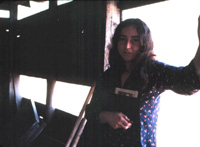
Folklorist Peggy Bulger during day of interviewing blacksmith Thomas Raines: Monticello, Florida (1977)
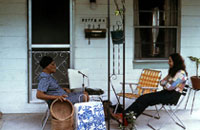
Bulger (right) interviewing basket maker Ella Mae Huffman: Gainesville, Fla. (1978)
Brenda McCallum
Brenda McCallum is best known in the folk studies field for her work in archiving folklife collections. Yet she worked with Peggy Bulger as one of Florida's first state folklorists in the late 1970s. As an intern with the Center for Southern Folklore, she collected some of the earliest images and recordings in the Florida Folklife Collection, and established informant contacts that were used by Florida folklorists for years. In addition, she was instrumental in establishing the Florida Folklife Program Archives, which forms the basis of the Florida Folklife Collection.
Among her projects with the FFP was the North Florida Folklife Project in 1978. Her publications include articles in the New York Folklore Journal and Tributaries: Journal of the Alabama Folklife Association, as well the book The Culture of Southern Black Women (1983). She also edited the book Local Color: A Sense of Place in Folk Art by William Ferris (1982). After her death, the American Folklore Society created the Brenda McCallum Prize for archiving folk collections in her honor.
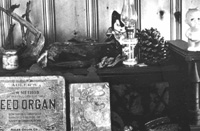
Articles in Maggie Melton's home (photographed by Brenda McCallum)
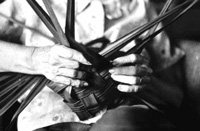
Evelyn Caffee Parks making a palmetto basket (photographed by Brenda McCallum)
Stetson Kennedy
Stetson Kennedy was one of the earliest folklorists working in Florida. Born in 1916, the Jacksonville native began collecting Northeast Florida folk sayings as a teenager. After a stint at the University of Florida, Kennedy joined the Florida WPA Writers Project in 1937 to administer the folklore, oral history, and ethnic studies section. Among the workers he supervised was novelist and anthropologist Zora Neale Hurston. Soon thereafter he published Palmetto Country, an exploration of Florida folklife edited by Erskine Caldwell. His papers from the WPA are housed within the Florida Folklife Collection.
Although he remained a lifelong folklife supporter, in the 1940s and 1950s, Kennedy also worked to end Jim Crow laws and helped exposed the Ku Klux Klan with several publications. The recipient of many awards, including the Florida Folk Heritage Award and the NAACP Freedom Award, he was also the subject of Library of Congress' folklorist Peggy Bulger's dissertation. Among his books are Southern Exposure, The Klan Unmasked, and South Florida Folklife, co-authored with Bulger and Tina Bucuvalas.
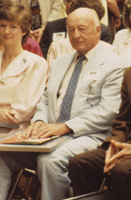
Stetson Kennedy just before receiving the 1988 Florida Folk Heritage Award at a ceremony in the State Capitol: Tallahassee, Florida
Zora Neale Hurston
Anthropologist, folklorist, and novelist Zora Neale Hurston first worked for the Work Projects Administration (WPA) in 1935 when she accompanied folklorist John Lomax on his first Florida fieldwork expedition. Three years later, unemployed despite her literary successes, Hurston again accepted federal assistance in May of 1938 when she took the position of "Junior Interviewer" with the Folklife Division of Florida's Federal Writers' Project (FWP). Folklorist Stetson Kennedy was her immediate supervisor.
At the time, Hurston, author of Jonah's Gourd Vine and Mules and Men, was the only published author on the Florida WPA payroll. Working out of her Eatonville home, she finished her fifth novel, Moses: Man of the Mountain while simultaneously conducting several folklife collecting trips throughout Florida. Interestingly, Hurston never mentioned her influential work with the FWP in her autobiography, an omission that may have been due to the stigma that was once associated with the WPA's relief programs.
For more biographical information on Hurston and her Florida folklife fieldwork, go to: Zora Neale Hurston, the WPA in Florida, and the Cross City Turpentine Camp.
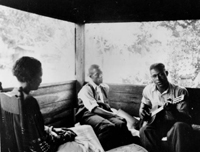
Gabriel Brown playing guitar as Rochelle French and Zora Neale Hurston listen: Eatonville, Florida, 1935
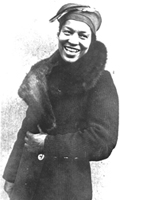
Portrait of Zora Neale Hurston : Eatonville, Florida
David A. Taylor
David A. Taylor is a Senior Folklorist with the American Folklife Center at the Library of Congress (LOC), where he is in charge of the Research and Program section. He also serves as the head of acquisitions for the Center's Archive of Folk Culture as well as the director of the Center's annual field school for cultural documentation. He received his MA and PhD in Folklife from Memorial University in Newfoundland. Focusing on boatbuilding in Norway and Newfoundland, his dissertation was published in 1982 as Boat Building in Winterton, Trinity Bay, Newfoundland.
While employed by the Florida Folklife Program (FFP) in the 1980s, Taylor worked on many projects including the Duval County Folk Arts in Education program and the Maritime Heritage Survey. The latter was a joint project between the LOC and the FFP, resulting in the 1992 publication, Documenting Maritime Folklife.
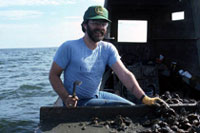
David Taylor culling oysters during fieldwork research: Apalachicola Bay, Fla. (1986)
Nancy Nusz
Nusz lives in Paris, France where she is an independent contractor for the Intangible Cultural Heritage Section of UNESCO. She is the former Folklife Director of the Oregon Historical Society and former Folklife Coordinator for Lewis and Clark College. She holds a B.A. in Sociology and Psychology and a M.A. in Folk Studies from Western Kentucky University. She worked for the Florida Folklife Program from 1982 – 1990. In that time she worked on the Folk Arts in Rural Education Project, the Southwest Florida Folk Arts Survey, the Maritime Heritage Survey, the Pursuits and Pastimes exhibit, the Miami-Dade Folklife Survey, Rural Folklife Days, and the Ida Goodson Recording Project.
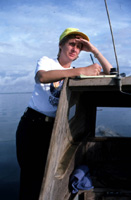
Nancy Nusz records field notes : Apalachicola Bay, Florida (1986)
Merri Belland
Belland originally worked as an artist-in-residence with the Stephen Foster Memorial in the early 1970s. Once the Florida Folklife Program began in 1976, she stayed on for another three years, training the public in the traditional arts. In 1979, she applied for and received a staff position with the FFP. Following her work with the FFP, Belland remained in White Springs to work as an educator with the Suwannee County School system, using her folklife studies to help develop school programs in food management and other areas.
In addition to accessing and arranging folk collections, she worked on numerous FFP projects including the Minorcan Folklife Area, the Seminole Slide Tape Project, the Florida Folk Arts Survey, the Maritime Heritage Survey Project, the Library Folklife Program, the West Florida Folklife Survey, and the Folk Arts in the School Libraries.
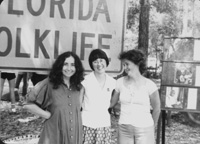
Peggy Bulger, Merri Belland and Charlotte Perry at the Folklife Demonstration Area of the 1978 Florida Folk Festival: White Springs, Florida
Tina Bucuvalas
Tina Bucuvalas served as State Folklorist with the Florida Folklife Program from 1996 to 2009. She is currently the Curator of Arts and Historical Resources for the City of Tarpon Springs. With a PhD from Indiana University and an M.A. from UCLA, Bucuvalas has worked in folk studies across the nation, including in Maine, Arizona, Wyoming, New Jersey, and Arkansas. But for the past twenty years she has focused primarily upon Florida's folklife.
She began her Florida work as a contract folklorist with the FFP on the Miami-Dade Folklife Survey, and served as the first folklorist with the Historical Museum of Southern Florida. In 1996, she returned to the FFP. In addition to fieldwork and program administration, Bucuvalas has published extensively, including many articles in Florida Heritage Magazine, various state and government publications, and most notably South Florida Folklife (1994) with Peggy Bulger and Stetson Kennedy and Just Above the Water: Florida Folk Arts (2005) with Kristin Congdon.
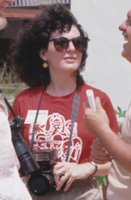
Tina Bucuvalas with ethnomusicologist Dale Olsen (left) and harpist Jesus Rodriguez (right) at the South Florida Folk Festival: Miami, Florida (1988)
Ormond Loomis
Former Bureau Chief of the Florida Folklife Program, Loomis is currently a professor at Florida State University.
Loomis worked on the West Florida Folklife Survey, Big Bend Folklife Survey, and Library Folklife Program. He also coordinated the research for and wrote Cultural Conservation: The Protection of Cultural Heritage in the United States (1983).
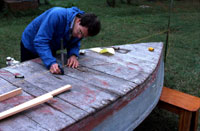
Ormond Loomis takes measurements of 12 foot "dinky": Eastpoint, Florida (1986)
Robert L. Stone
Robert L. Stone is a folklorist based in Gainesville, Florida. He worked for the FFP throughout the 1990s, where he worked on such projects as the Florida Folk Arts Apprenticeship program. Since 1997 he has served as statewide Outreach Coordinator for the Florida Folklife Program on a contract basis.
During his tenure as a state folklorist in 1992, Stone discovered in South Florida the use of steel guitars in African American Pentecostal House of God churches. While this tradition dated back to the 1930s, it was relatively unknown outside of that small religious community. Since that time, Stone has revived the popular awareness of religious steel guitar performance. He has recorded several albums through Arhoolie Records, directed a documentary, written several articles, including for Sing Out! and New York Folklore, and is currently writing a book on the Sacred Steel tradition.
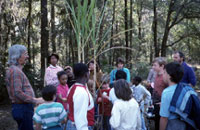
Stone giving a program to students at the Rural Folklife Days: White Springs, Fla. (1991)
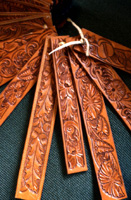
Leather belt pattern sample used by Bob Dellis: Okeechobee, Florida (photographed by Stone in 1992)
Gregory Hansen
Gregory Hansen is an Assistant Professor of Folklore and English at Arkansas State University, where he also teaches graduate classes in Heritage Studies. In the late 1980s and early 1990s, he ran the Duval County Folk Arts in the School program for the FFP, after the departure of David Taylor. He worked as the Education Coordinator for the Florida Folklife Program from 2000 to 2002, during which time he conducted research throughout the state, taught teacher and public workshops, and provided cultural interpretation at folklife events.
A PhD graduate of Indiana University, Hansen has spent the last decade investigating the Southeastern United States and Midwest folk cultures, as well as the relation between folklore and education, public folklore, and documentary media. He has completed public folklore projects for the Smithsonian Institution, Danish Immigrant Museum, Kentucky Center for the Arts, and other organizations. In addition to numerous articles and paper presentations, Hansen edited a special issue of the Folklore Forum and published articles in the Encyclopedia of the Midwest and Peoples of America. He has also produced a documentary video on oral history and folklife, and assisted with the production of audio recordings of traditional music. His latest book, A Florida Fiddler: The Life and Times of Richard Seaman is published by the University of Alabama Press. Richard Seaman's fiddle tunes and stories are included in the Florida Folklife Collection.
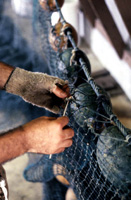
Rickey Doublerly knitting a fishing net : Jacksonville, Florida (photographed by Gregory Hansen, 1988)
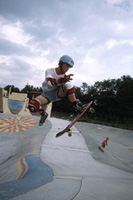
Ben French performing an aerial move: Jacksonville, Florida (photographed by Gregory Hansen, 1988)
Thelma Ann Boltin
Thelma Ann Boltin, affectionately known by many as "Cousin Thelma," was the voice and face of the Florida Folk Festival for 30 years, an institution that she helped found in 1952. Although never academically trained, Boltin was actively involved in the field of folklore for over 40 years, and became known as the "Queen of Florida Folklife." She served as the chairman of folk music for the Florida and National Federation of Music Clubs and was the recipient of a national award from the American Association for State and Local History for "contributions to preservation and popularization of Florida folkways, folklore, and folk music."
Born in Beaufort, South Carolina in 1904, she moved with her family to Gainesville in 1907 where she became one its most active community leaders. After a stint at Emerson College in Boston, Boltin began teaching high school speech and drama. From 1954 through the 1980s, Boltin was actively involved with the Florida Folk Festival, as co-founder, performer, promoter, director, and emcee. She died in 1992.
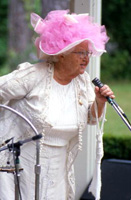
Thelma Boltin: White Springs, Florida (1982)

 Listen: The FolkFolk Program
Listen: The FolkFolk Program